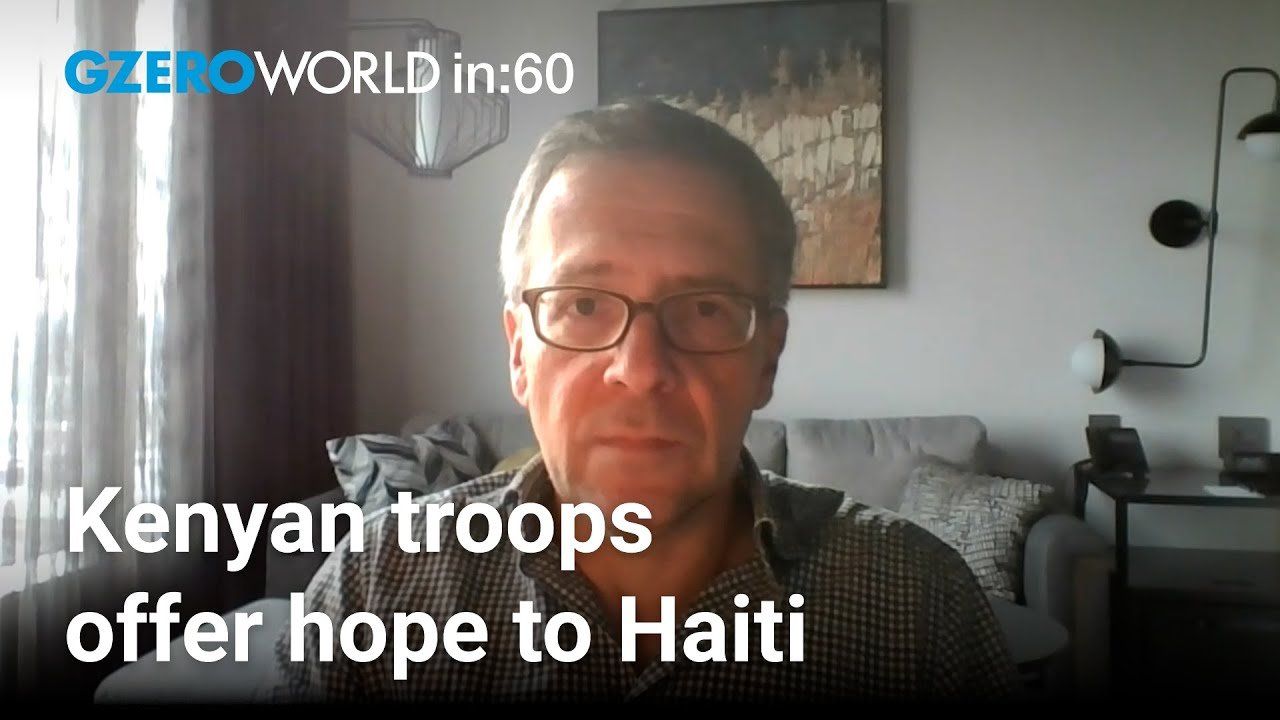Ian Bremmer shares his insights on global politics this week on World In :60.
Will the UN's deployment of troops to Haiti help bring peace to the country?
It certainly won't hurt, you know, a thousand Kenyan troops being deployed, as well as lots support for training of police and militias. There's been no government in Haiti. It's been taken over by gangs, massive amounts of violence and vigilantism in response. They need help. The UN's history in Haiti has been absolutely checkered and problematic. And so there are a lot of people that are concerned about this. But on balance, I'm really glad that finally someone is getting something done better. Frankly, if the US and Canada had played at least some role in this, given that their/our backyard.
Despite all his legal issues, is Trump still the candidate-to-beat in the race for the GOP nomination?
Oh, absolutely. And, you know, you know that I mean, we're seeing only gains compared to all the other candidates. The real question is, can trump win the presidency? And at this point, you have to say, of course, it's plausible, in part because the Republicans are performing better in the views of the voters, the electorate on the economy. Certainly illegal immigration numbers on the back of pent up demand and nobody moving for a few years of pandemic are now at record levels again. And there's very little Biden can do before the election to stop it. And of course, he's seen as too old to run and that's not going to be less true in 14 months. Trump has his own litany of serious personal challenges, and the Democrats and a lot of independents hate him with a true passion. That certainly matters. The abortion issue certainly matters, and incumbency certainly matters. So right now, if you make me make a bet, I'd still bet that Biden is likely to win by a little, but it's real close. I have no confidence in that call.
Bed bugs in Paris. My God. Would you still attend the Summer Olympics?
I thought bed bugs were things you caught in a bed. Like in a bed that's not clean. We need to change the name, at least, because apparently people are getting bed bugs in movie theaters and on metros and all over these public places in Paris. So I think we can't call them bed bugs. The first I want Macron to give us a new, more patriotic name for this animal that apparently anybody can catch pretty much anywhere. And yeah, it wouldn't stop me from going to Paris Olympics, though I've got a lot of other stuff I need to do, but I'd probably be a little careful where I sit down, crowded places and things like that. I don't know. Can't do any. There’s not any cream you put on yourself to avoid bed bugs. Who the hell knows? I guess you're going to find out if you're going to Paris.
- Ian Explains: Trump's Republican competition ›
- Will Trump’s “sham” talk go unchecked? ›
- The country that wants to take on Haiti’s gangs ›
- What We’re Watching: UN mulls Haiti intervention, petrol workers join Iran protests, Biden tightens tech exports to China ›
- Why is Haiti such a disaster? ›
- What We’re Watching: Argentine VP’s legal woes, angry Haitians, Pakistan’s Qatari cash push, Trump’s DOJ suit ›
More For You
People in support of former South Korean President Yoon Suk Yeol rally near Seoul Central District Court in Seoul on Feb. 19, 2026. The court sentenced him to life imprisonment the same day for leading an insurrection with his short-lived declaration of martial law in December 2024.
65: The age of former South Korean President Yoon Suk Yeol, who was sentenced to life in prison on Thursday after being found guilty of plotting an insurrection when he declared martial law in 2024.
Most Popular
In an era when geopolitics can feel overwhelming and remote, sometimes the best messengers are made of felt and foam.
The Hungarian election is off to the races, and nationalist Prime Minister Viktor Orbán is facing his most serious challenger in 16 years.
Does skepticism rule the day in politics? Public opinion data collected as part of the Munich Security Conference’s annual report found that large shares of respondents in G7 and several BRICS countries believed their governments’ policies would leave future generations worse off.
